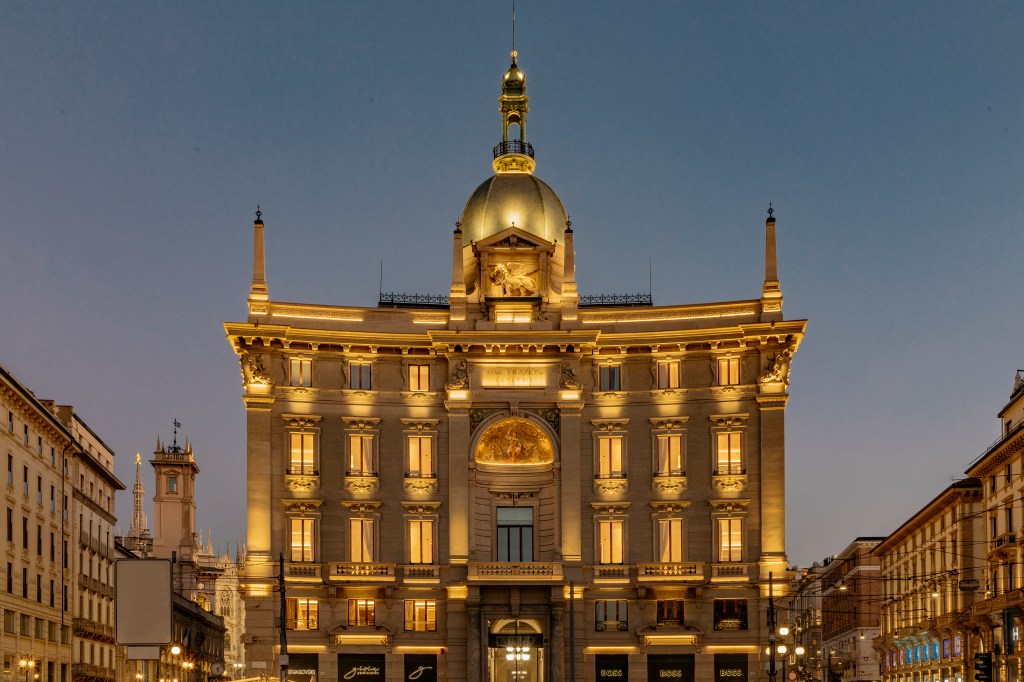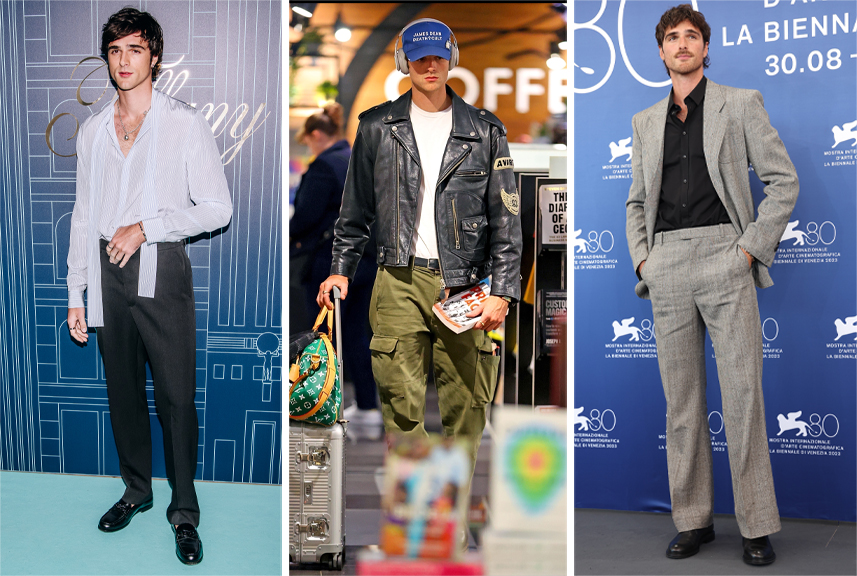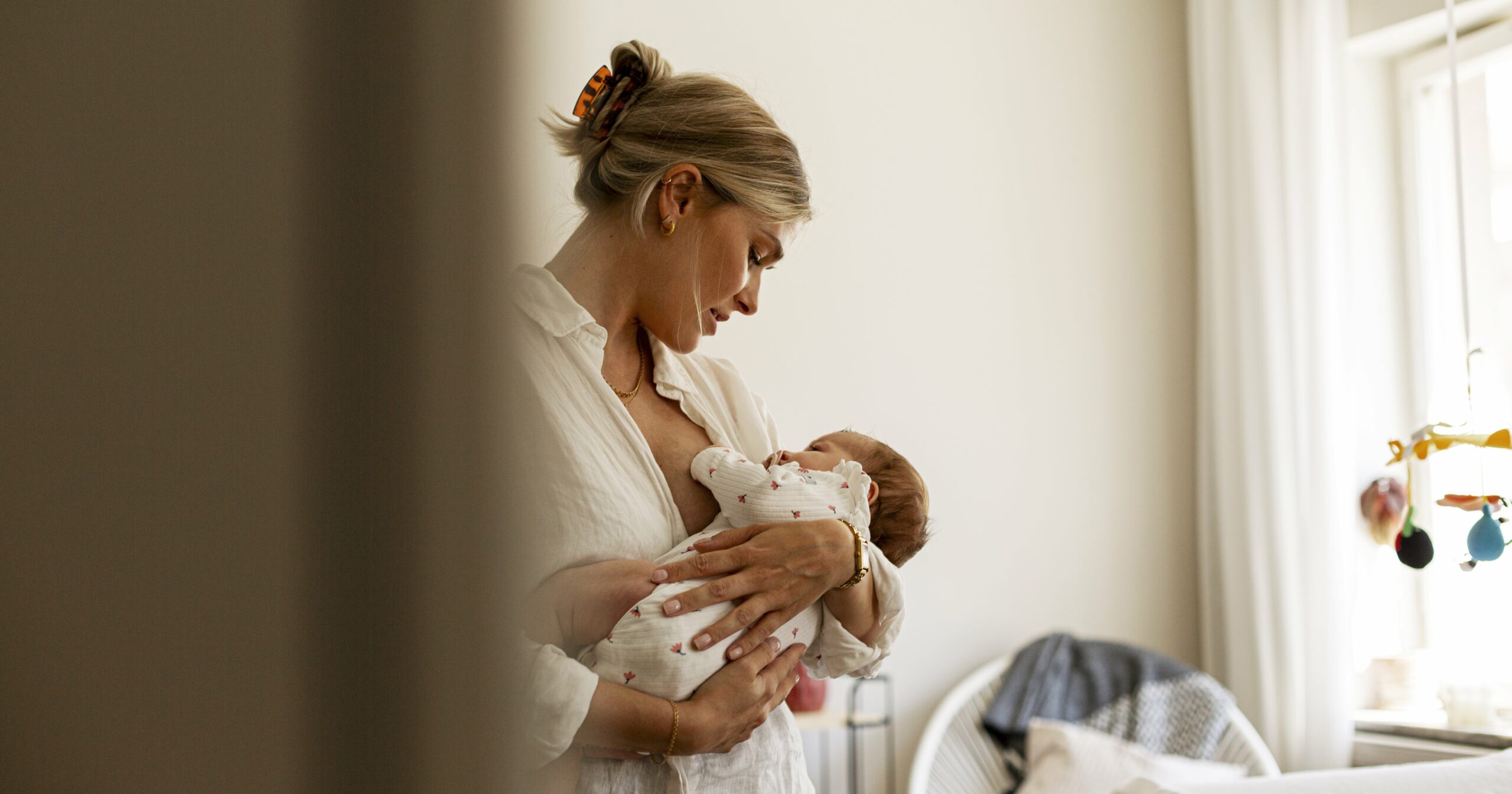This men’s fashion week, Milan is ready to show off its new places to visit and hang out between shows, fashion parties and presentations.
Palazzo Cordusio Gran Melià
Located inside Palazzo Venezia, a 19th-century building in the center of the city designed by the architect Luca Beltrami for asset manager Generali, the Palazzo Cordusio, Gran Meliá (Cordusio Palace) has opened its doors.
The five-star hotel’s architecture and interiors were entrusted to Asah di Alvaro e Adriana Sans Studio, which designed the 84 rooms and suites with balconies and large windows overlooking the Duomo, Piazza Cordusio, Via Orefici and the Sforzesco Castle. Generali Real Estate and Melia Hotels International with architectural studio Marco Piva oversaw the buildings’ facades and internal public spaces.
Sunset Hospitality Group manages the hotel’s multiple culinary experiences. On the first floor, there’s Gioia Pasticceria, a patisserie created with master baker Fabio Bertoni. Inside, the court hosts Giardino Cordusio, a cocktail bar in collaboration with renowned bartender Giancarlo Mancino (don’t miss his Negroni Alfresco, kept for 30 days in an urn). There’s also Isola [island], led by chef Francesco Bagnato, who prepares dishes from the Italian islands combined with a wide wine selection, and Sachi, where chef Moon Kyung Soo offers omakase, the Japanese dining experience that involves placing one’s trust in the chef for a personalized meal.
In the basement, guests can find a wellness area with an indoor swimming pool, saunas and Turkish bath, while a gym is on the third floor.

Palazzo Cordusio Gran Meliá
Piazza Cordusio, 2 – 20123
melia.com
Sabbadini Atelier
Sabbadini has brought together its boutique, factory, design studio and offices in Milan.
The atelier in Via Sant’Andrea takes visitors on a journey through the history of the Sabbadini brand over 3,390 square feet and four floors. The atelier’s basement houses offices, while the upper floors the creative studio and prototype factory. The first room on the ground floor presents the setting and original decor of the former Via Montenapoleone boutique.
Conceived by famed architect Renzo Mongiardino, the relocation of the artwork, now under the tutelage of the Superintendence of Cultural Heritage, was curated by the Milan-based Studio Peregalli. The courtyard represents a reception space for Sabbadini’s international customers.
The brand was founded in the early 20th century in Spain by Alberto Esquenazi and later established in Milan by his son-in-law Bruno Sabbadini. Now, the brand is carried on by Pierandrea and Micol Sabbadini, the fourth generations of the founding family, who have taken the baton from their parents Alberto and Stefania.
The Sabbadini boutique project was entrusted to architect Ezio Riva, who used an eclectic mix of materials and colors for the space, including gold velvet windows and cabinet displays, and metalwork paneling.

Sabbadini Atelier
Via Sant’Andrea, 5 – 20121
02-76–00–8228
sabbadini.com
Carhartt WIP
Carhartt WIP has opened its third location in Corso Garibaldi, in the Brera district. The store carries the men’s collection as well as projects and collaborations.
Salomee Faeh and Milanese architect Andrea Caputo conceived the design of the store. Industrial details appear throughout, such as concrete walls and vertical steel piping, as well as a unique, archival “boogie man” structure in the window. A sound system is also integrated into the till area. These details are offset by more refined touches, including marble flooring and solid wood tables.
The location features store-exclusive products featuring artwork by S.E.E., the creative studio led by the Los Angeles-based designer and illustrator Eric Elms, known for his distinctive style that often incorporates bold colors, shapes and typefaces. In collaboration with Carhartt WIP, his artwork has been applied to a series of T-shirts, hooded sweatshirts and a Detroit Jacket, all inspired by Dante Alighieri’s “Inferno.”
“Dante is an iconic Italian figure and created an entire world full of insane imagery surrounding the nine circles of hell,” Elms said. “To me, it’s less about the circles and more about how each sin or circle title is almost a trope unto itself. I like experimenting with ideas on the verge of turning into tropes. These concepts become so omnipresent they start losing their significance. Maybe Dante is even so iconic that he is a trope that no one thinks much about anymore,” he added.

Carhartt WIP
Corso Garibaldi, 20 – 20121
02-72-19-1832
carhartt-wip.com
Bar Nico
At Via Cesare Saldini, 2, a new bar project from Chiara Pino and Riccardo Ganelli has popped up in a space that was originally a tire repair shop, and at one point, a pasta factory.
The renovation project was conceived by architect Marco Mannacio Soderini, founder of the Milan-based Sagoma Studio, who added rough materials like steel and concrete to the location. The name Nico was chosen to celebrate the owners’ Afghan greyhound as seen in the logo.
The focus is on artisanal wines ranging from France’s Beaujolais and Borgogna, to Italy’s offer from Apulia, Lazio and Piedmont regions.

Bar Nico
Corso Garibaldi, 20 – 20331
barnicomilano.com
Trattoria del Ciumbia
The Triple Sea Food restaurant group has unveiled its third project in the Brera district.
Trattoria del Ciumbia opened at Via Fiori Chiari, 32, and seats 100 guests. The space was designed by Dimore Studio and inspired by Milan’s traditional trattorie, or informal restaurants.
Chef Paolo Rollini heads the kitchen and combines typical Milanese cuisine with international flavors. The Risotto alla Monzese, saffron rice with sausage, or the Lumache della Valtellina in umido, stewed snails, are among the standouts. Sommelier Francesco Bardi is in charge of the wine list.
At the entrance, a wooden and glass compass with curtains recalls the entrances of the trattorias of the past, offset by an imposing counter embellished with brass-profiled display cases. This shows dishes by Anita Cerrato — a Japanese Kintsugi artist — and outlines the aperitif area. A central balcony, which overlooks the staircase leading to the basement, extends the view to the second room, creating a continuum characterized by flamed walnut wood paneling and mixed-color floor tiles arranged in a mosaic.
The space is finished with retro-style newspaper racks, coat hooks and a series of watercolors depicting Italian Rationalist architecture from the ’30s. The furnishings are complemented with original accessories by Dimoremilano.

Trattoria del Ciumbia
Via Fiori Chiari, 32 – 20121
trattoriadelciumbia.com
“Humanity. Jimmy Nelson” Exhibition
Palazzo Reale is exhibiting 65 large-format photographs by Jimmy Nelson until Feb. 4 that celebrate the cultural diversity of Indigenous people as examples of resilience from every part of the world, such as West Papua, Tibet, Africa, Siberia and Bhutan.
The photographer spent his whole life traveling around the world establishing deep connections with these communities, with special attention to their cultures. “From an artistic point of view, I am fascinated by the aesthetic of Indigenous populations. Their brightly colored clothing, their sophisticated crafts, and their breathtaking landscapes provide me with a rich visual tapestry to capture beauty through my lens,” said the artist.
Another important feature in his works is the interplay between the subjects and nature. Valleys, mountains, plains, or waterways always surround the subject, telegraphing a deep respect for nature.

Palazzo Reale
Piazza del Duomo, 12 – 20122
Tel. 02-88-46-5230
palazzorealemilano.it
“Vincent Van Gogh. Pittore colto [The cultured painter]” Exhibition
The exhibition “Vincent Van Gogh. Pittore colto [Vincent Van Gogh. The cultured painter] runs until the end of January at Mudec. It has been curated by art historian Francesco Poli, Mariella Guzzoni, researcher and curator of the exhibition section “Van Gogh. Vivere con i libri [Life with books]” and Aurora Canepari, curator of the exhibition section “Van Gogh. Il sogno giapponese, Da Parigi alla Provenza [The Japanese dream, from Paris to Provence].”
The exhibition displays 40 works from the Kröller-Müller of Otterlo in the Netherlands, which owns a wide collection of the artist’s paintings and drawings. The show focuses on the cultural interests that spurred Van Gogh’s vision of life and art, and aims to enhance the dialogue between the artworks and a curated selection of art books and magazines coming from Italy’s Malatestiana library.
The exhibition is chronological, spanning over the four phases of the artist’s life, ranging from his early days in Holland, moving on to the Parisian period and then his Japanese influences. It concludes with his life in Arles.

Via Tortona, 56 – 20144
mudec.it



